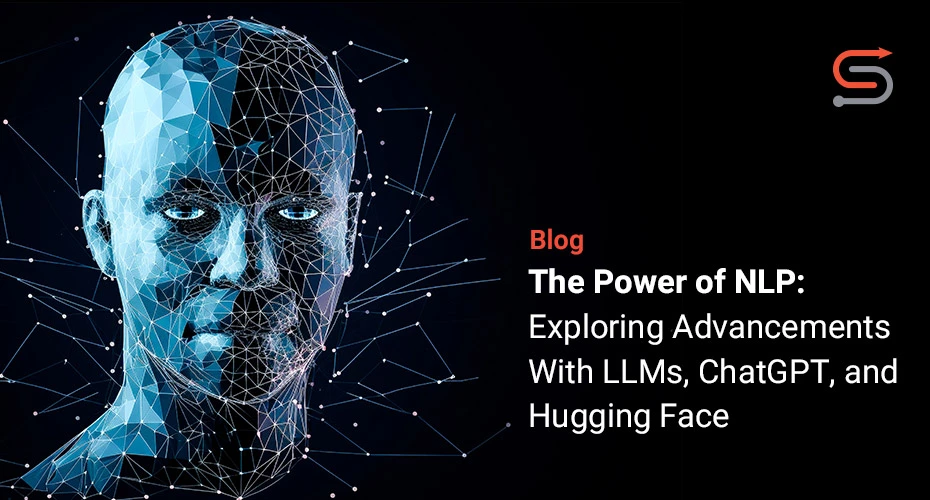

September 5, 2023 - by Anish Purohit
NLP (Natural Language Processing) has become a pervasive technology, transforming various industries with AI-driven algorithms. Businesses now rely on NLP to process and understand human language, from online search and spell-check to chatbots and spam filters. In this blog, we explore the latest advancements in NLP, including the emergence of Large Language Models (LLMs) and the contributions of OpenAI, ChatGPT, and Hugging Face.

NLP, an AI application, enables computers to understand and interpret human language. By employing algorithms, it identifies key elements and extracts meaning from text or speech, empowering intelligent machines to communicate and process information like humans. With LLMs and advanced techniques, NLP can now uncover hidden expressions and valuable inferences, resolving ambiguity and enabling efficient information extraction.
LLMs revolutionize NLP by enhancing performance and versatility. These models excel at language-related tasks by leveraging vast amounts of training data. LLMs like OpenAI’s GPT series and models available through Hugging Face offer powerful capabilities for understanding and generating human-like language.
OpenAI’s ChatGPT is an advanced AI language model designed to engage in natural conversations with users. OpenAI has been at the forefront of NLP advancements, with their ChatGPT model being a prominent example. ChatGPT leverages the power of LLMs to generate natural and contextually relevant responses, making significant strides in conversational AI. Its ability to understand and generate human-like language can revolutionize customer support, virtual assistants, and more.
Hugging Face has emerged as a leading platform for NLP models and resources. Their Transformers library is crucial in fine-tuning LLMs and creating custom NLP solutions. Hugging Face empowers developers to harness the potential of NLP in their applications by providing easy access to pre-trained models and facilitating model deployment.
Natural Language Processing is a rapidly evolving field with a wide range of applications across various industries and domains. Let’s look at the key applications of NLP:
NLP-driven chatbots are transforming customer service by providing quick and relevant self-service experiences. NLP algorithms can handle basic queries, freeing human agents for more complex tasks. The combination of NLP and LLMs enables chatbots to guide users through processes and provide precise resolutions.
This blend of NLP and LLMs empowers these chatbots to offer personalized assistance, paving the way for enhanced customer engagement and satisfaction. As industries increasingly adopt AI-driven customer service solutions, the potential for efficient query handling and enriched user interactions becomes a reality, all while optimizing human resources for more strategic endeavors.
NLP’s syntactic and semantic analysis is critical in identifying and categorizing spam emails. By examining raw and unstructured text, NLP algorithms effectively filter out unwanted emails while minimizing false positives, ensuring better email management and security.
This streamlines email management and bolsters cybersecurity measures, ensuring sensitive information remains protected. As NLP continues to refine its techniques, the war against spam gains an ally, one that adapts and learns from the ever-evolving landscape of electronic communication. The combination of NLP’s analytical acumen and advanced learning models stands as proof of the remarkable strides in email security, highlighting its critical role in safeguarding digital correspondence.
NLP solutions excel at extracting insights from unstructured data. By analyzing tone, sentiment, and relational links among words or phrases, NLP algorithms help extract relevant information from vast volumes of text and audio. Financial companies leverage NLP to make informed trading decisions based on market trends and company data.
The fusion of linguistic analysis and data interpretation equips these organizations with a competitive edge. This enables them to dissect patterns and seize opportunities that might escape human observation. As NLP improves, it will change decision-making in different industries by uncovering hidden information from large amounts of data.
The information overload era necessitates effective data summarization. NLP allows organizations to summarize large documents and understand deeper emotional meanings. By analyzing customer call transcripts or social media data, NLP aids in determining the sentiment towards a product or service, providing valuable marketing insights.
Analyzing data helps businesses make better decisions and market effectively by understanding customer sentiment in real-time. NLP’s proficiency in uncovering these subtleties ensures that organizations remain attuned to the evolving preferences of their target audience. This enhances their ability to craft compelling narratives and make impactful connections.
NLP-driven search engines enable intuitive search experiences by understanding and answering natural language questions. By extracting meaning from queries, NLP algorithms provide precise answers quickly, making information more accessible and improving user experiences. Through the integration of semantic comprehension and linguistic analysis, NLP facilitates a user experience that emulates human interaction with information.
This feature benefits users in two ways. One, it helps find relevant content quickly and two, it improves their experience by providing instant results and reducing frustration caused by traditional search methods. As NLP advances, internet exploration is getting ready for an era of more convenience and effectiveness.
Advancements in NLP, including LLMs, OpenAI’s ChatGPT, and Hugging Face, have significantly expanded the capabilities of language processing technology. These advancements empower businesses across sectors to leverage the technology for better customer service, spam identification, information extraction, summarization, and intuitive search. As NLP continues to evolve, organizations must embrace these advancements to drive business efficiency and unlock new opportunities in the ever-expanding world of natural language processing.
Discover advanced AI solutions that can transform your business processes.
Anish Purohit is a certified Azure Data Science Associate with over 11 years of industry experience. With a strong analytical mindset, Anish excels in architecting, designing, and deploying data products using a combination of statistics and technologies. He is proficient in AL/ML/DL and has extensive knowledge of automation, having built and deployed solutions on Microsoft Azure and AWS and led and mentored teams of data engineers and scientists.